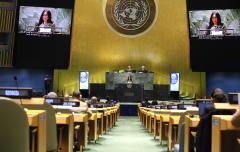Climate funding neglects small-scale, decentralised energy, report says
International pubic climate funds are too focused on large-scale grid extension, to the detriment of small-scale off-grid and mini-grid services that are often quicker and cheaper to deploy, a recent report says.
Analysing figures from the Climate Funds Update (CFU) database, the working paper by the International Institute for Environment and Development and international NGO Hivos says only 3% of international climate funds – an annual average of $51 million -- is allocated to decentralised energy.
In comparison, the International Energy Agency has estimated that an additional $23 billion a year needs to be invested in decentralised energy in order to ensure energy access for all.
“International public climate finance is making only a small contribution to the overall financing needs for providing energy access to everyone by 2030,” the report, entitled “Unlocking climate finance for decentralised energy access”, says.
The CFU database covers public finance for all major international climate funds.
The report identifies a number of key barriers to climate finance supporting decentralised renewables:
- International climate funds do not have the right instruments or design elements that would enable them to prioritise decentralised energy access.
- Climate funders are looking for viable projects that will assure returns from credit-based investments. As an emergent sector, decentralised energy projects are less bankable, and need a range of financial instruments besides loans.
- Investing in utility-scale projects offers better returns from loans and lower transaction costs when compared with funding large numbers of small decentralised projects.
- Specific features of international climate funds can discourage investment in small-scale decentralised projects. For example, various mitigation funds assign higher weight to factors such as greenhouse gas emission reductions and leveraging co-finance, incentivising large-scale investments in middle income countries that are better able to demonstrate such achievements.
- International climate funds also face a range of general blockers such as policy frameworks that favour grid-based energy or fossil fuels over decentralised energy and renewables.
The report points to lessons at the country level from Bangladesh and Nepal, where a conducive policy framework, dedicated special-purpose agencies, diverse financial instruments and encouragement from national banks have helped to support investment in decentralised energy services.
Its recommendations include a range of priorities to improve targeting of international climate finance for decentralised energy access in low-income countries, strengthen national enabling environments, fill knowledge gaps and share lessons.
The full report can be read here.



